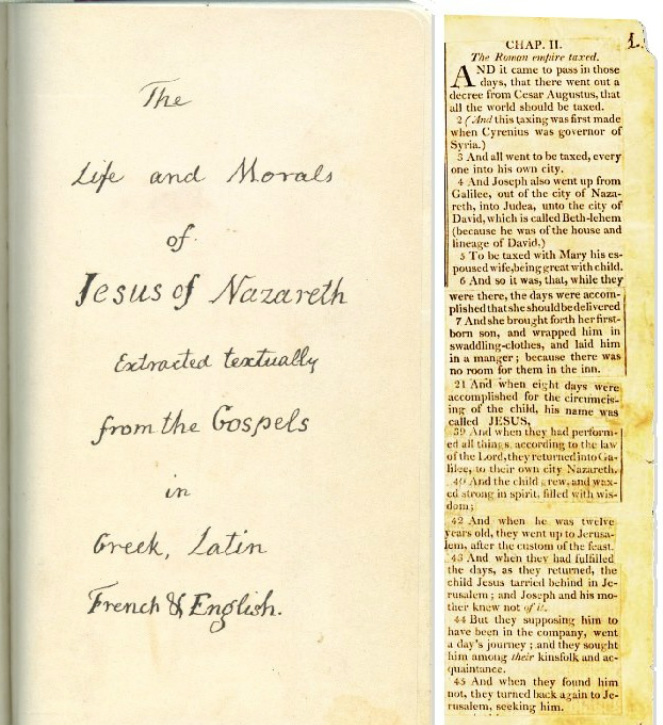 Thomas Jefferson sat down with eight Bibles and a sharp blade. He sliced from the books of Matthew, Mark, Luke, and John. Then he carefully organized and pasted his selections into a convenient single thread titled, The Life and Morals of Jesus of Nazareth. Why eight Bibles? He needed two each for English, Greek, Latin, and French! See this amazing work for yourself at http://americanhistory.si.edu/jeffersonbible. This was not the first Bible project of the man better known for the Declaration of Independence and the Louisiana Purchase. While still president of the United States, he made a prototype with the whopping title, The Philosophy of Jesus of Nazareth, being Extracted from the Account of His Life and Doctrines Given by Matthew, Mark, Luke and John; Being an Abridgement of the New Testament for the Use of the Indians, Unembarrased with Matters of Fact or Faith beyond the Level of their Comprehensions. Some people are disappointed to learn that in re-assembling the gospels, Jefferson purposely omitted miracles and everything supernatural. Consider Jesus’ birth, as pasted by Jefferson below: Born in a manger? Check. Angels, shepherds, and star-gazing wise men? Cut. “Whatsoever ye would that men should do to you, do ye even so to them.” The golden rule is on page 13. Turning water into wine? Evaporated. The crucifixion? Present! The resurrection? Jefferson’s assemblage concludes, “There laid they Jesus, and rolled a great stone to the door of the sepulcher, and departed.” Jefferson believed God existed. He famously declared, “We hold these truths to be self-evident, that all men are created equal, that they are endowed by their Creator with certain unalienable Rights.” However, once the Creator had created, Jefferson and others found no trustworthy evidence that God had anything more to do with this world.  Disclosure: I cut and paste. When I recently wrote about losing my wallet, what verses did I cite? I referenced the heroic shepherd seeking his lost sheep, the diligent woman seeking her lost coin, the gracious father welcoming home his lost son. In telling of my fumble, did I mention Psalm 49:10? That's the one that says, “The fool and the stupid alike must perish and leave their wealth to others.” No, I did not cite Psalm 49:10. So, yes, I too cut the Bible. Do you? Jefferson felt he was not so much cutting as restoring. He was liberating Jesus’ words from later corruptions. Of the prototype he wrote, “I have performed this operation for my own use, by cutting verse by verse out of the printed book, and arranging the matter which is evidently his, and which is as easily distinguishable as diamonds in a dunghill. The result is an octavo of forty-six pages, of pure and unsophisticated doctrines, such as were professed and acted on by the unlettered Apostles, the Apostolic Fathers, and the Christians of the first century.” Jefferson may have cleverly posed his abridgement as “for the Use of the Indians” to deflect orthodox criticism of his omissions.  Granted, the Bible that Jefferson perforated is itself a cut-and-paste job. The books of the Bible were written by around 40 people over around 1500 years. The new technology of the bound book around AD 100 must have partly encouraged a definitive collection. “Dude, you still use scrolls? Get a book! I can carry all the scriptures in my arms.” “Yeah, yeah, but there’s something about unrolling a scroll that prepares my mind for God’s word.” What books belong in the Bible? The Protestant reformers held for a set of 66. Roman Catholic Bibles add Tobit, Judith, and six more books, and more chapters to Daniel. Eastern Orthodox Bibles add yet four more books and a Psalm 151. On the other hand the Samaritans count as scripture just Genesis, Exodus, Leviticus, Numbers, and Deuteronomy. (The Samaritans were Jews left behind during the Babylonian exile. Fewer than 800 live today.) Who picked the Bible books? Recent dramatists pose a struggle of authorities occurring centuries after Jesus. The record suggests a more complicated history. When the church authorities eventually showed up in the late 300’s, they mainly endorsed what had already been in use in most churches for 300 years. For the first Christians, the Jewish scriptures were scripture. As I will cite, beginning in the second generation after Jesus, Christians came to hold also the gospels and many letters as authoritative. They rejected some writings as bogus. Every once in a while, dramatists discover these “lost books” or “suppressed books”—and sell ‘em. But these books have never been secret. Check out the nicely-organized indexes at www.earlyjewishwritings.com and www.earlychristianwritings.com. What a wealth of candidate Bible books! How did the early Christians choose what made the cut? We can tell by what early Christians rejected, that a primary concern was that trustworthy words came from those who had walked with Jesus, that is, the apostles. This requirement excluded many writings outright. According to letters of early Christians, they kicked out writings claiming to be from Mary or Thomas or others if the writings lacked external bona fides of apostolic origin, such as whether previous or indeed any Christians accepted the writings. Beyond historic apostolic origin, the content had to bear Jesus’ style. While Jefferson would later appeal, “we hold these truths to be self-evident,” Jesus more intimately observed, “My sheep know my voice.” The significance of self-authenticating writings is the subject of Canon Revisited by Michael Kruger. Far from being a product of elites, for better or worse the formation of the New Testament tends more toward folk effort, the practical evaluations of independent Christians and congregations. We can tell what they accepted by their quotations. Within a couple of decades of Jesus' death, Paul must address the additions of gnostics and judaizers. At the other extreme, a fellow named Marcion proposed to cut the books of the Bible from around 66 to 11. Such challenges brought Christians to compare notes on what writings they accepted as reliable, and why. These lively exchanges survive! This handy table starts with Ignatius of Antioch (who died around AD 110) and concludes with Jerome’s Vulgate of AD 405. See also here and here. The Muratorian Fragment dated around AD 170 is the earliest formal list of accepted books of the Bible. It acknowledges as trustworthy four gospels, Acts, and many but not all of the presently-accepted letters. It identifies marginal writings that “ought to be read, but not publicly” because its author is not “among the Apostles”. It specifically identifies some writings as forgeries. If you care to question such ancient choices, go ahead. Rejected writings are available for your inspection. (Not all of them. Some vanished. Indeed, writings that could have been authentic books of the Bible have vanished! Paul wrote to the Corinthians before he wrote 1 Corinthians, and he wrote to Laodecia. Several writings claim to be these lost letters! But they seem to have been written too late to be genuine. There are also lost books of the Jewish scriptures.) Some Christians deplore Thomas Jefferson’s cut and paste omission of miracles. I am concerned that Jefferson trusted the principles of Jesus, but not the power of Jesus. Moreover, Jefferson in his old age came to ignore some principles of Jesus. For example, the Bible generally did not condemn slavery, except indirectly. “Whatsoever ye would that men should do to you, do ye even so to them.” As a young man, Jefferson spotlighted such basics and went further: “We hold these truths to be self-evident, that all men are created equal, that they are endowed by their Creator with certain unalienable Rights, that among these are Life, Liberty and the pursuit of Happiness.” Having affirmed that, and calling slavery a "hideous blot", Jefferson continued to own slaves and gradually came to exploit his slaves. He advised an acquaintance to see slaves as a solid investment: “negroes, which besides a present support bring a silent profit of from 5. to 10. per cent in this country by the increase in their value.” Here is a passage from Luke 4 that did not make Jefferson's Bible. And Jesus came to Nazareth, where he had been brought up. And as was his custom, he went to the synagogue on the Sabbath day, and he stood up to read. And the scroll of the prophet Isaiah was given to him. He unrolled the scroll and found the place where it was written, Jesus here has made a Declaration of Independence! If you don't like miracles, just take "recover of sight to the blind" metaphorically. Thus, Jesus' statement of purpose should excite everyone!
In 1776, at the risk of alienating slave holders, Thomas Jefferson stirringly affirmed such Liberty as "inalienable rights". In 1820, Jefferson omitted "liberty to the captives". Finding hypocrisy in others is easy. I think Jefferson's slicing afflicts everyone who opens the Bible. Rather than seek what Jesus and others really said and the core messages that repeatedly shout through, we conveniently cut out the parts we don't like. How holey is your Bible?
1 Comment
|
Our Writers:At The Surge we love doing things together... that includes writing a blog! Here are a few of our main contributing authors: Greg JohnsonJesus++ Dwaine DarrahOur fearless leader, Dwaine is the lead pastor at The Surge. His experience in counter terrorism with the CIA prepared him for ministry and he likes dogs and babies even more than E does. EE (short for Eric Reiss) is the Wingman at The Surge and likes dogs, music, Mexican food, his wife Karen and his little girl Evangeline... not necessarily in that order. Archives
June 2024
Categories
All
|
|
|
The Surge Community Church
Meeting Sunday Mornings at The State Theatre in Falls Church, 11:10am! Rebroadcast Available Sunday Evenings with SurgeOnDemand, 7:00pm! |



 RSS Feed
RSS Feed
